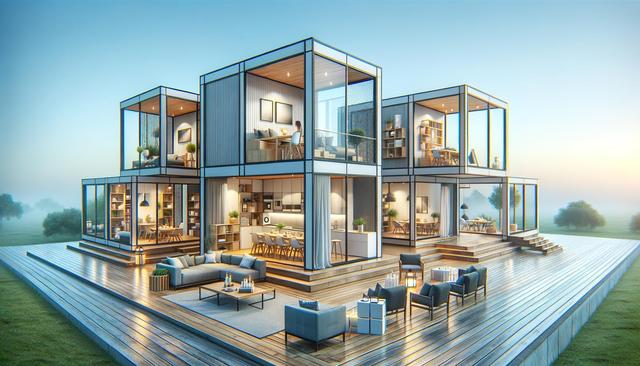
Comfort Meets Efficiency: Discover the Appeal of Modern Modular Homes
The Rise of Modular Living
As housing demands evolve and environmental concerns grow, modular homes are emerging as a compelling solution for modern living. These homes are pre-fabricated in sections at a factory and then assembled on-site, significantly reducing construction time and waste. Unlike traditional homes, which can take many months to build, modular homes are often ready for occupancy in a matter of weeks. This speed, combined with a focus on efficiency, makes them particularly attractive to those looking for a streamlined path to homeownership.
Modular housing is not a new concept, but technological advancements and design innovation have transformed it into a highly desirable option. Today’s modular homes are engineered to meet or exceed local building codes and can be customized to reflect personal tastes and lifestyles. They offer an appealing alternative for those seeking quality housing that is both flexible and environmentally responsible.
Sustainable Materials and Green Construction
One of the key advantages of modern modular homes is their emphasis on sustainability. From the ground up, these homes are designed with eco-friendliness in mind. Builders often use recycled or renewable materials, energy-efficient windows, and non-toxic finishes to ensure minimal environmental impact. The controlled environment of the factory also leads to less material waste and more precise construction.
Key sustainability features commonly found in modular homes include:
- High-performance insulation for improved thermal regulation
- Low-flow plumbing fixtures to conserve water
- Energy-efficient HVAC systems and appliances
- Solar panel integration for renewable energy generation
This focus on green construction not only benefits the planet but also results in lower utility bills and a healthier indoor environment for occupants. For environmentally conscious buyers, modular homes offer a practical and responsible choice.
Customizable Designs for Every Lifestyle
Modern modular homes are no longer limited to simple, boxy layouts. Today, they come in a wide array of styles, from minimalist urban dwellings to spacious family homes with multiple stories. Homeowners can work with designers to tailor floor plans, choose interior finishes, and incorporate personalized features like smart home systems or home offices.
Popular customization options include:
- Open-concept kitchens and living areas
- Floor-to-ceiling windows for natural light
- Integrated storage solutions
- Outdoor living spaces such as decks or patios
This level of personalization ensures that modular homes can accommodate various household sizes and preferences, making them suitable for young professionals, growing families, and retirees alike. The flexibility of design enhances the livability of these homes and adapts to the changing needs of their residents.
Smart Technology Integration
Another hallmark of contemporary modular homes is the seamless integration of smart technology. Many of these homes are equipped with systems that enhance convenience, security, and energy management. From automated lighting to app-controlled thermostats, modular homes are designed to support modern digital lifestyles.
Some common smart features include:
- Voice-controlled home assistants
- Remote security monitoring systems
- Automated climate control
- Smart kitchen appliances
These technologies not only contribute to the overall efficiency of the home but also elevate comfort levels. Homeowners can enjoy greater control over their living environment, whether they are home or away. The integration of smart systems is increasingly seen as a standard rather than a luxury in the modular housing market.
Faster Construction and Long-Term Value
Time is a crucial factor when building a new home, and modular homes excel in this area. Because much of the construction occurs off-site in a factory setting, weather delays and scheduling conflicts are minimized. This leads to faster project completion and a more predictable timeline for buyers.
Beyond quick assembly, modular homes are built to last. They undergo rigorous quality checks during the manufacturing process and are constructed with durable materials designed to withstand transportation and installation. These homes often come with structural warranties and meet strict code requirements, ensuring long-term reliability and peace of mind.
In terms of investment, modular homes can offer good value. Their energy efficiency, low maintenance needs, and adaptability to future upgrades or expansions make them a smart choice for homeowners looking to maximize their return. As public awareness and appreciation for modular housing grow, resale values have also become increasingly competitive in many markets.
Conclusion: A Modern Housing Solution for Today’s Needs
For individuals and families seeking comfortable, efficient, and stylish living spaces, modern modular homes present a well-rounded alternative to traditional construction. These homes combine sustainability, customization, and smart technology to create environments that support contemporary lifestyles. Whether you’re looking to reduce your carbon footprint, move in quickly, or enjoy a personalized home design, modular housing offers practical advantages. As the housing landscape continues to evolve, modular homes stand out for their ability to meet the demands of the present while anticipating the needs of the future.


